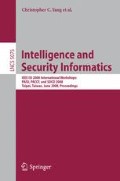Abstract
A password-based three-party encrypted key exchange (3PEKE) is a protocol enables any pair of two registered clients to establish session keys via the help of a trusted server such that each client shares only one password with the server. This approach greatly improves the scalability of key agreement protocol in distributed environments, and provides great user convenience. This paper proposes a new password-based 3PEKE scheme with only four message steps, which is the minimum among the published works. The proposed scheme is secure in the random oracle model.
Access this chapter
Tax calculation will be finalised at checkout
Purchases are for personal use only
Preview
Unable to display preview. Download preview PDF.
References
Bellare, M., Desai, A., Pointcheval, D., Rogaway, P.: Relations among Notations of Security for Public Key Encryption Schemes. In: Krawczyk, H. (ed.) CRYPTO 1998. LNCS, vol. 1462, pp. 26–45. Springer, Heidelberg (1998)
Bellare, M., Pointcheval, D., Rogaway, P.: Authenticated Key Exchange Secure against Dictionary Attacks. In: Preneel, B. (ed.) EUROCRYPT 2000. LNCS, vol. 1807, pp. 139–155. Springer, Heidelberg (2000)
Bellare, M., Rogaway, P.: Provably Secure Session Key Distribution: The Three Party Case. In: 27th ACM Symp. on the Theory of Comput., pp. 57–66. ACM Press, New York (1995)
Chang, C.C., Chang, Y.F.: A Novel Three-Party Encrypted Key Exchange Protocol. Computer Standards and Interfaces 26(5), 471–476 (2004)
Chien, H.Y.: Selectively Convertible Authenticated Encryption in The Random Oracle Model. The Computer Journal (January 17, 2008) (2008) doi:10.1093/comjnl/bxm090
Chung, H.R., Ku, W.C.: Three Weaknesses in a Simple Three-Party Key Exchange Protocol. Information Sciences 178(1), 220–229 (2008)
Ding, Y., Horster, P.: Undetectable On-Line Password Guessing Attacks. ACM Operating Systems Review 29(4), 77–86 (1995)
Kohl, J., Neuman, C.: The Kerberos Network Authentication Service (V5). Internet Request for Comments 1510 (1993)
Ku, W.C., Chiang, M.H., Chang, S.T.: Weaknesses of Yoon-Ryu-Yoo’s Hash-Based Password Authentication Scheme. ACM Operating Systems Review 39(1), 85–89 (2005)
Lee, T.F., Hwang, T., Lin, C.L.: Enhanced Three-Party Encrypted Key Exchange without Server Public Keys. Computers and Security 23(7), 571–577 (2004)
Lin, C.L., Sun, H.M., Hwang, T.: Three Party-Encrypted Key Exchange: Attacks and a Solution. ACM Operating System Review 34(4), 12–20 (2000)
Lin, C.L., Sun, H.M., Steiner, M., Hwang, T.: Three-Party Encrypted Key Exchange without Server Public-Keys. IEEE Commun. Lett. 5(12), 497–499 (2001)
Lu, R., Cao, Z.: Simple Three-Party Key Exchange Protocol. Computers Security 26(1), 94–97 (2007)
Molva, R., Tsudik, G., Van Herreweghen, E., Zatti, S.: KryptoKnight Authentication and Key Distribution System. In: Deswarte, Y., Quisquater, J.-J., Eizenberg, G. (eds.) ESORICS 1992. LNCS, vol. 648, pp. 1–16. Springer, Heidelberg (1992)
Nam, J., Kim, S., Won, D.: Attack on the Sun-Chen-Hwang’s Three-Party Key Agreement Protocols Using Passwords. IEICE Trans. on Fund. of Electronics, Communications and Computer Sciences E89-A(1), 209–212 (2006)
Steiner, M., Tsudik, G., Wainder, M.: Refinement and Extension of Encrypted Key Exchange. ACM Operation Systems Review 29(3), 22–30 (1995)
Sun, H.M., Chen, B.C., Hwang, T.: Secure Key Agreement Protocols for Three-Party against Guessing Attacks. The Journal of Systems and Software 75, 63–68 (2005)
Chien, H.Y., Wang, R.C., Yang, C.C.: Note on Robust and Simple Authentication Protocol. The Computer Journal 48(1), 27–29 (2005)
IEEE P1363.2: Password-Based Public-Key Cryptography, http://grouper.ieee.org/groups/1363/passwdPK/index.html
Gong, L.: Optimal Authentication Protocols Resistant to Password Guessing Attacks. In: The 8th IEEE Workshop on Computer Security Foundations, p. 24 (1995)
Gong, L.: Lower Bounds on Messages and Rounds for Network Authentication Protocols. In: The 1st ACM Conference on Computer and Communications Security, pp. 26–37 (1993)
Author information
Authors and Affiliations
Editor information
Editors and Affiliations
Rights and permissions
Copyright information
© 2008 Springer-Verlag Berlin Heidelberg
About this paper
Cite this paper
Chien, HY., Wu, TC. (2008). Highly Efficient Password-Based Three-Party Key Exchange in Random Oracle Model. In: Yang, C.C., et al. Intelligence and Security Informatics. ISI 2008. Lecture Notes in Computer Science, vol 5075. Springer, Berlin, Heidelberg. https://doi.org/10.1007/978-3-540-69304-8_8
Download citation
DOI: https://doi.org/10.1007/978-3-540-69304-8_8
Publisher Name: Springer, Berlin, Heidelberg
Print ISBN: 978-3-540-69136-5
Online ISBN: 978-3-540-69304-8
eBook Packages: Computer ScienceComputer Science (R0)

